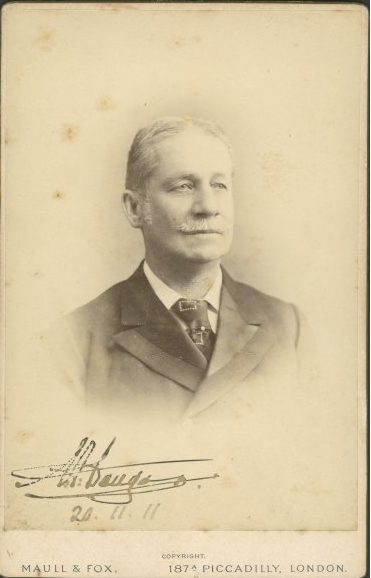
Alexander Douglas Douglas (7 February 1843– 5 February 1914), inspector of police and
explorer, was born at St Helier, Channel Islands, son of Alexander
Douglas Douglas, formerly Mackenzie, army officer, and his wife Ann, née Rouse.
He was the grandson of Sir Kenneth Mackenzie, a colonel in the 58th Foot, who was created a
baronet 30 Sep 1831 and assumed by Royal Licence 31 Oct 1831 the name
and arms of
Douglas of
Glenbervie.His joined
the navy in 1857 as a cadet and served in the Tientsin campaign and the Taiping rebellion. His experiences gave him a taste for wandering and
adventure. In 1865 he left the navy and migrated to Rockhampton,
Queensland. For a time he satisfied his wanderlust by working as a
teamster and drover.
Douglas joined the paramilitary Queensland Native Police in 1872 on
the recommendation of Acting Queensland Police Commissioner Thomas
Barron, who served in the military with Douglas during the Opium
Wars. Douglas was trained as a cadet in this force by the
notoriously brutal officer, Frederick Wheeler, and his first posting
was at the Marlborough barracks in central coastal Queensland.
Douglas was appointed Acting Sub-Inspector at Marlborough in early
1873 and was immediately expected to give "salutary lessons" to the
local Aboriginal people. This he proceeded to do by leading his
troopers in massacres of Aboriginals at St Lawrence and at Calliope.
Public pressure from media reports forced an enquiry to be held at
the Prospect Hotel in Calliope headed by other police officers, but
despite clear evidence multiple people were shot dead, Douglas was
exonerated of charges of wantonly destroying life. Later in 1873,
Douglas' entire detachment of troopers deserted with allegations of
floggings and cruel treatment by Douglas being the reason.
He soon won promotion to
sub-inspector in charge of the area from Cooktown to the Palmer River
goldfield. In 1874 he was ordered to blaze a new trail from the
goldfields to Cooktown, a task which suited his taste, but led several
extrajudicial "dispersals" of Aboriginals. In late 1874, after the
killing of the Stroh family travelling to the Palmer River, Douglas
led severe reprisals against Aboriginals in the area. Newspaper
articles reported that "the blacks...died the death they so richly
deserved and...we may hope that his Sniders will reach a few more of
them."
His success
on the Cookston trail secured him a second commission to find a practicable route to the new Normanby field, and in 1876 to yet another new goldfield, the Hodgkinson.
For these achievements he ranks with the important explorers of the
north.
In 1879 Douglas moved to a new station, Jundah, in the west, but next
year was sent back to the north, this time to Biboohra on the Atherton
Tableland. His services were much in demand and he was brought to
Brisbane in 1881 to take charge of white police, but in 1882 he was sent
to Herberton in the north. Once again exploratory duties called him:
with four troopers, two old gold diggers and five Chinese, he blazed yet
another trail, this time from Herberton to Mourilyan. On this trip the
party was without rations and in continuous rain for twenty days, living
mainly on roots, but the leadership of Douglas brought them through. He
established a new native police camp at Mourilyan, and the government
allocated to him a small steamship Vigilant to assist his patrols
of the coast. At the end of 1884 he was given charge of the Townsville
district, but from May to September 1885, during the Russian scare,
because of his naval experience he was appointed commander of H.M.S.
Otter in the Queensland navy. His next move was to Roma but in 1886
he was sent north to Georgetown in charge of the Gulf district. There he
took charge of the largest gold escort, 26,000 oz., ever recorded in
Queensland. In 1888 he moved his headquarters to Normanton where he
remained until 1891. In 1893 he returned to Roma but in May 1898 became
senior inspector of the Northern district, stationed at Townsville. In
1900 he was transferred to Brisbane and on 1 July succeeded John Stuart
as chief inspector of the Queensland Police.
in 1900, be became a Justice of the Peace. He acted as commissioner
four times and in 1902 went to Roma to investigate the Kenniff case. In 1905 Douglas was superannuated and returned to
England. He was awarded the Imperial Long Service medal in 1907.
On 19 April 1884 at Charters Towers as a widower he had married Lucie,
who at 3 had come to Australia in 1858 with her father Abraham Street,
of Alva, Stirlingshire. They had no children. She died on 13 May 1905.
He married for a third time in 1906 Susan Williams, who was still living
in 1921.
On 5 February 1914 he died in a private hospital near
Portsmouth.
Sources:
• Australian Dictionary of Biography, et al.


